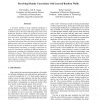Free Online Productivity Tools
i2Speak
i2Symbol
i2OCR
iTex2Img
iWeb2Print
iWeb2Shot
i2Type
iPdf2Split
iPdf2Merge
i2Bopomofo
i2Arabic
i2Style
i2Image
i2PDF
iLatex2Rtf
Sci2ools
120
click to vote
ICDM
2009
IEEE
2009
IEEE
Resolving Identity Uncertainty with Learned Random Walks
A pervasive problem in large relational databases is identity uncertainty which occurs when multiple entries in a database refer to the same underlying entity in the world. Relational databases exhibit rich graphical structure and are naturally modeled as graphs whose nodes represent entities and whose typed-edges represent relations between them. We propose using random walk models for resolving identity uncertainty since they have proven effective for finding points which are proximately located in a network. Because not all types of relations are equally helpful in alleviating identity uncertainty, we develop a supervised approach to learning the usefulness of different database relations from a training set of database entries whose true identities are known. When tested on the task of resolving uncertainty of ambiguously named authors in bibliographical data, the learned random walk models yield performance superior to support vector machines, and to a related spectral clusterin...
| Added | 23 May 2010 |
| Updated | 23 May 2010 |
| Type | Conference |
| Year | 2009 |
| Where | ICDM |
| Authors | Ted Sandler, Lyle H. Ungar, Koby Crammer |
Comments (0)

